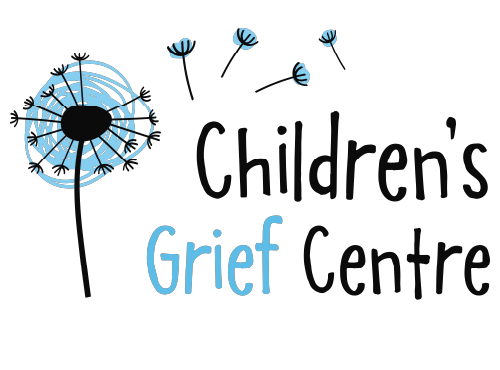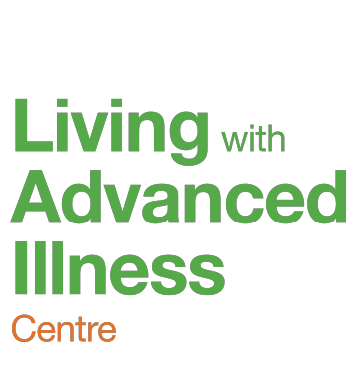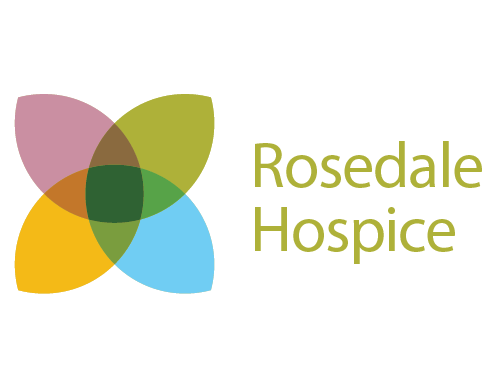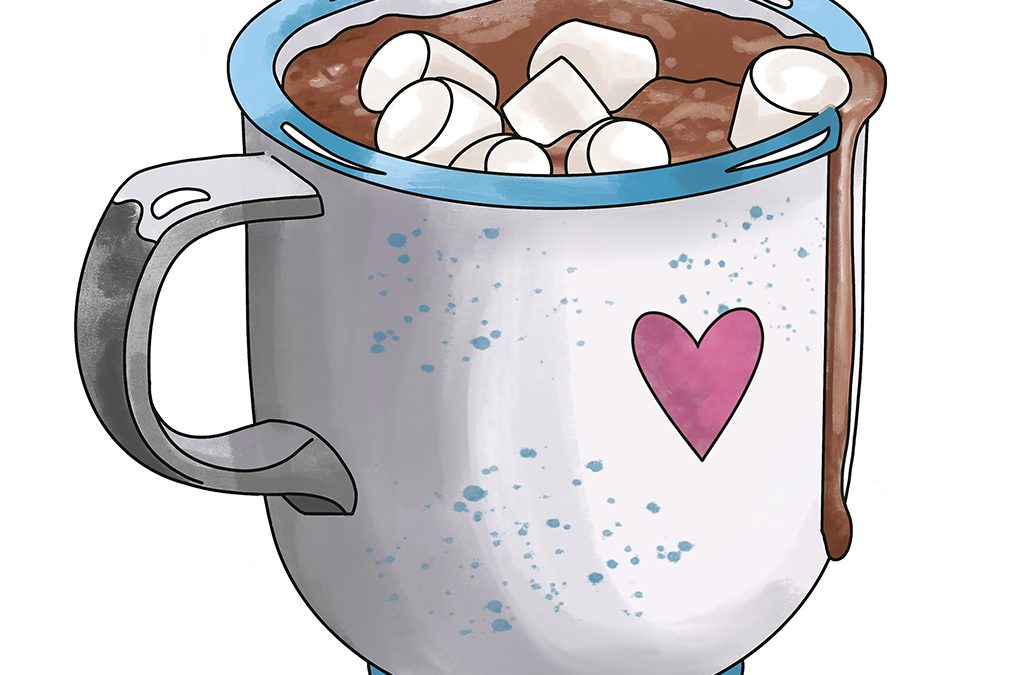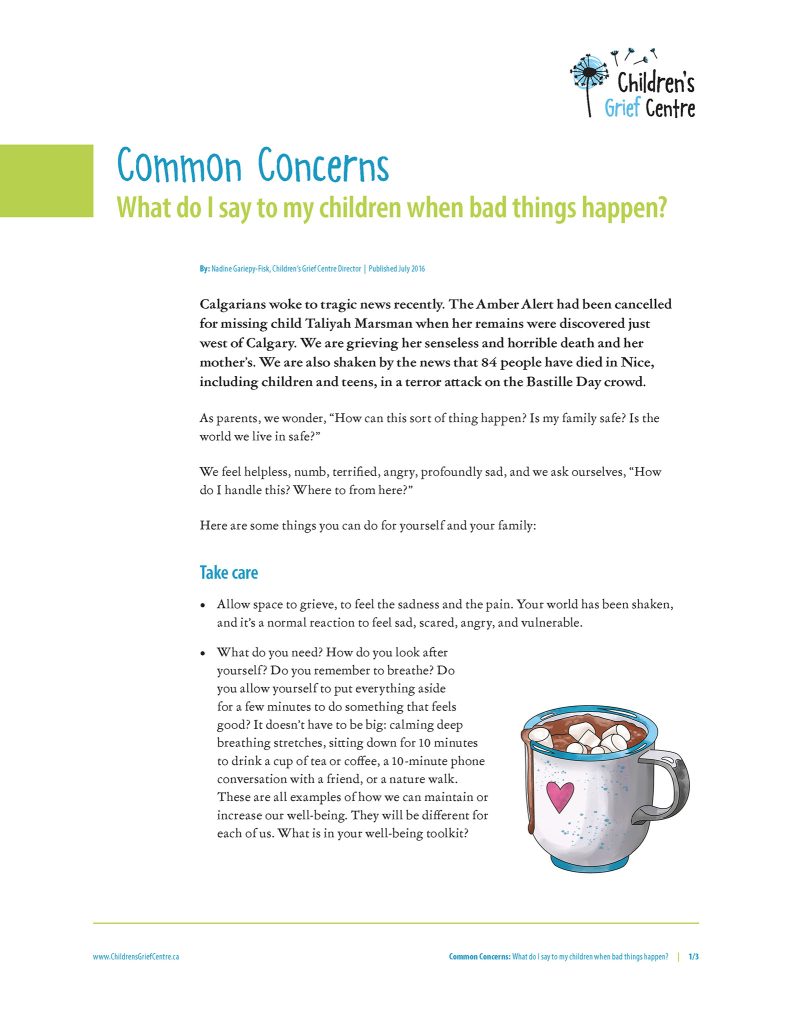Common Concerns
What do I say to my children when bad things happen?
Text is based on a blog post written by Nadine Gariepy-Fisk, Children’s Grief Centre Director | Published July 2016
Calgarians woke to tragic news recently. The Amber Alert had been cancelled for missing child Taliyah Marsman when her remains were discovered just west of Calgary. We are grieving her senseless and horrible death and her mother’s. We are also shaken by the news that 84 people have died in Nice, including children and teens, in a terror attack on the Bastille Day crowd.
As parents, we wonder, “How can this sort of thing happen? Is my family safe? Is the world we live in safe?”
We feel helpless, numb, terrified, angry, profoundly sad, and we ask ourselves, “How do I handle this? Where to from here?”
Here are some things you can do for yourself and your family:
Take care
- Allow space to grieve, to feel the sadness and the pain. Your world has been shaken, and it’s a normal reaction to feel sad, scared, angry, and vulnerable.
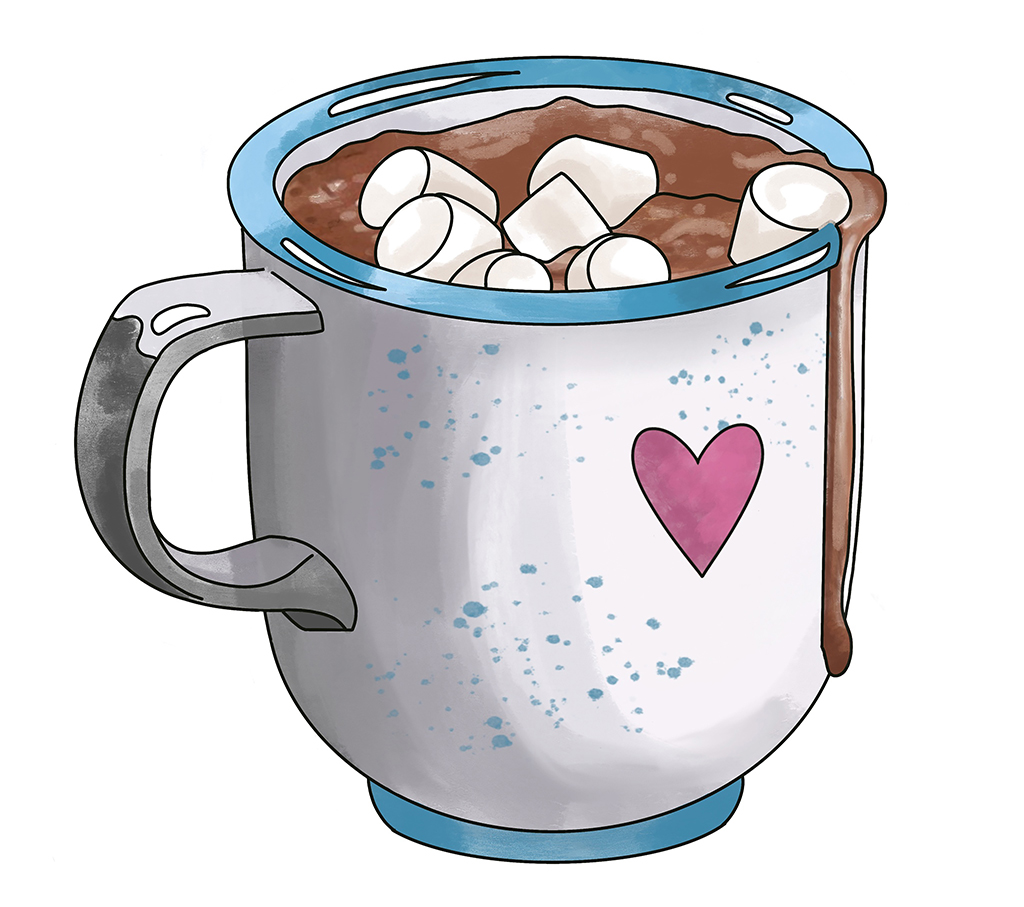 What do you need? How do you look after yourself? Do you remember to breathe? Do you allow yourself to put everything aside for a few minutes to do something that feels good? It doesn’t have to be big: calming deep breathing stretches, sitting down for 10 minutes to drink a cup of tea or coffee, a 10-minute phone conversation with a friend, or a nature walk. These are all examples of how we can maintain or increase our well-being. They will be different for each of us. What is in your well-being toolkit?
What do you need? How do you look after yourself? Do you remember to breathe? Do you allow yourself to put everything aside for a few minutes to do something that feels good? It doesn’t have to be big: calming deep breathing stretches, sitting down for 10 minutes to drink a cup of tea or coffee, a 10-minute phone conversation with a friend, or a nature walk. These are all examples of how we can maintain or increase our well-being. They will be different for each of us. What is in your well-being toolkit?
Do I talk to my children about this? If so, what should I tell them?
WHY?
If they have seen or heard information about it, it’s important that you discuss this with them. If they are not aware of this week’s events, you may want to address the fear or anxiety it has created in you in a less direct way. If you are affected, then it’s likely they are as well. They sense your sadness and your anxiety. They may feel you more distant or preoccupied as well. It provides an opportunity to talk about safety and what we do to keep ourselves safe.
WHO?
The news is all over media and social media. Is your child or teen on social media? We do not want our children to feel scared and vulnerable by hearing bad news without the support and reassurance of family. It is best for children to hear bad news directly from their parents or caregivers. It strengthens the trust between children and parents or caregivers. Avoid watching the news in your children’s presence and limit your own exposure. Keep in mind that images are very powerful and tend to be more difficult to let go of than a story we hear or read.
WHEN?
It is probably best to do it sooner rather than later unless you know that your child will not be exposed to this topic from other sources. You may start a conversation in response to your child/teen’s questions or could use presenting opportunities (e.g., discussions about safely crossing the street, reminding them to call you to let you know where they are) to start a conversation.
HOW?
Remain calm. Children will take their cue from our tone of voice and body language. Choose a time when you can cuddle or just hang out with them or reach out to touch their hand for reassurance. Avoid having a difficult conversation while rushing out the door or at bedtime. They may associate bad news and bad feelings with bedtime, which may lead them to fear sleep. Keep conversations short, put the focus on reassurance and make time to talk about good things too, or at least one good thing that happened during the day or that they wish to happen the next day.
WHAT?
Limit the information you share. Answer their questions without giving more information than what they are asking. “Did the little girl die? “Yes, she did.” Did someone hurt her?” “Yes.”
Give reassurance but be careful not to make promises that you cannot keep. It’s perfectly acceptable to say that these are very rare events. Talk about what systems you have at home, for example, holding hands before crossing the street or always letting mom and dad know where you are. Including in the discussion other safety measures and systems we implement in our daily lives help children and teens feel safe. Be careful not to say, “We’ll always be there to protect you” or “this will never happen here.” While we wish we could make these promises, we simply cannot.
This “feeling safe” conversation is one you may need to have again and again. Don’t impose it, and don’t overcrowd your children. Again, they will be alarmed by your behaviour. We are reminded that life is precious, and we may feel like we don’t want to let our children out of our sight… ever again.
How do we hold our children tight while giving them space to discover the world and themselves? Isn’t it the question we ask ourselves every day?
For more information, a consultation, or to seek support for your child, teen, and family, contact us at 403-263-4525 or info@childrensgriefcentre.ca.
